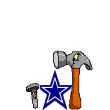MarcusRock
Well-Known Member
- Messages
- 15,461
- Reaction score
- 18,137
Looking at the gif clip you posted, uhhhhhh, Dez caught the ball AND TOOK 3 STEPS BEFORE LUNGING FORWARD, thus solidifying he did actually make a catch!!! Plus, since he was touched and tripped AS HE MADE THE CATCH AND BEFORE HE STARTED LUNGING FORWARD, Dez proved he had possession, thus didn't have to maintain possession as the ball hit the ground since he already had proven he had possession prior to lunging forward. But since he was touched/tripped when he proved possession of the catch and as he lunged forward, the ground can not cause a fumble. It should have been ruled a catch and called down at the 6 inch line mark just short of the goal line.
Lol. Y'all just don't understand. 3 steps didn't matter if you were deemed going to the ground then. And he was deemed going to the ground. He could have taken 5 steps on the way down to the ground. Also doesn't matter if he was touched or not because the rule says there's no difference. Dez also didn't lunge. He tried, but slipped and a proper lunge is the only thing that shows a player is not going to the ground, again per the rules. Why don't you quote them if you actually have a handle on them? Here they are from 2014. Go!
RULE 8, Section 1
Article 3 Completed or Intercepted Pass. A player who makes a catch may advance the ball. A forward pass is
complete (by the offense) or intercepted (by the defense) if a player, who is inbounds:
Note 2: If a player has control of the ball, a slight movement of the ball will not be considered a loss of possession. He must
lose control of the ball in order to rule that there has been a loss of possession.
If the player loses the ball while simultaneously touching both feet or any part of his body to the ground, it is not a catch.
Article 3 Completed or Intercepted Pass. A player who makes a catch may advance the ball. A forward pass is
complete (by the offense) or intercepted (by the defense) if a player, who is inbounds:
a) secures control of the ball in his hands or arms prior to the ball touching the ground; and
b) touches the ground inbounds with both feet or with any part of his body other than his hands; and
c) maintains control of the ball long enough, after (a) and (b) have been fulfilled, to enable him to perform any act
common to the game (i.e., maintaining control long enough to pitch it, pass it, advance with it, or avoid or ward off an
opponent, etc.).
Note 1: It is not necessary that he commit such an act, provided that he maintains control of the ball long enough to do so.b) touches the ground inbounds with both feet or with any part of his body other than his hands; and
c) maintains control of the ball long enough, after (a) and (b) have been fulfilled, to enable him to perform any act
common to the game (i.e., maintaining control long enough to pitch it, pass it, advance with it, or avoid or ward off an
opponent, etc.).
Note 2: If a player has control of the ball, a slight movement of the ball will not be considered a loss of possession. He must
lose control of the ball in order to rule that there has been a loss of possession.
If the player loses the ball while simultaneously touching both feet or any part of his body to the ground, it is not a catch.
Item 1: Player Going to the Ground. If a player goes to the ground in the act of catching a pass (with or without contact
by an opponent), he must maintain control of the ball throughout the process of contacting the ground, whether in the field
of play or the end zone. If he loses control of the ball, and the ball touches the ground before he regains control, the pass
is incomplete. If he regains control prior to the ball touching the ground, the pass is complete.
by an opponent), he must maintain control of the ball throughout the process of contacting the ground, whether in the field
of play or the end zone. If he loses control of the ball, and the ball touches the ground before he regains control, the pass
is incomplete. If he regains control prior to the ball touching the ground, the pass is complete.




